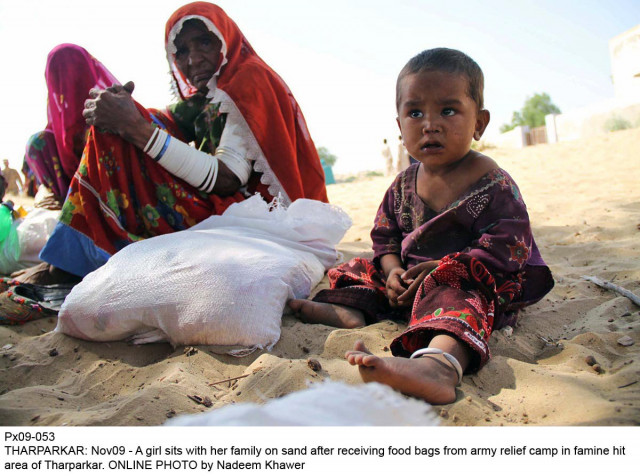Sindh govt approaches SC over SHC's probe into Tharparkar deaths
Provincial government seeks early hearing of SC's suo motu proceedings into the case

Advocate General Sindh Abdul Fattah Malik filed a three page application, available with The Express Tribune, on behalf of the Sindh government in the Sindh registry of the apex court, seeking early hearing of suo motu proceedings into the death of infants in Tharparkar.
The application states that despite the pendency of suo motu’s proceeding, the SHC has also taken up a number of petitions. These petitions, filed among others by Pakistan Institute of Labour Education and Research, seek the court's directions for authorities to provide immediate relief to hundreds of the affected families and punish the officials responsible for it.
The provincial government had also submitted a comprehensive report in the high court, wherein it stated that Pakistan People’s Party (PPP) Senator Taj Haider has been appointed as the focal person to look into the relief activities in Tharparkar.
The provincial government also furnished details of steps that it has taken for giving relief to the people.
The application further stated that it was expected that the high court would dispose the case after the submission of comprehensive report, submitted by various provincial government departments.
The Sindh government has contended that due to certain people, the matter is continuing to linger, in addition to certain quarters in the media who were projecting the issue out of proportion by publishing reports which were incorrect.
The application further stated that since the issue is pending before the apex court, these petitioners have no ground (locus standi) to file pleas in the high court under Article 199 of the constitution.
Though the provincial government already formed a commission to probe Thar tragedy, the SHC on October 31 suspended the notification of that commission and appointed a judicial commission by directing session judges of the draught hit areas to inquire into the matter.
The provincial government in its plea requested the top court to intervene into the matter and set aside the high court’s October 31 order on the constitution of commission in the interest of justice.
In March, the former Chief Justice of Pakistan Tassaduq Hussain Jillani had taken notice of deaths in Thar.
Advocate General Sindh Fateh Muhammad Malik on March 11 had conceded responsibility for the death of children in the drought-wrecked district.
The top court on March 17 had sought explanation from chief secretary Sindh Sajjad Saleem Hotiyana on why the provincial government had not taken steps after the United Nations (UN)’s warnings of draught in Tharparkar five years ago.
Former CJP Iftikhar Muhammad Chaudhry had also written a letter to the SC, stating that the situation was tantamount to denial of fundamental rights of citizens of Tharparkar under Article 9 and 14 of the Constitution, as according to media no adequate arrangements were made to save the lives of human beings as well as livestock.
The letter had further stated that about 175,000 families were affected, asking the SC to initiate proceeding to enforce fundamental rights of a large number of public of District Tharparkar under Article 184(3) of the Constitution.



















COMMENTS
Comments are moderated and generally will be posted if they are on-topic and not abusive.
For more information, please see our Comments FAQ